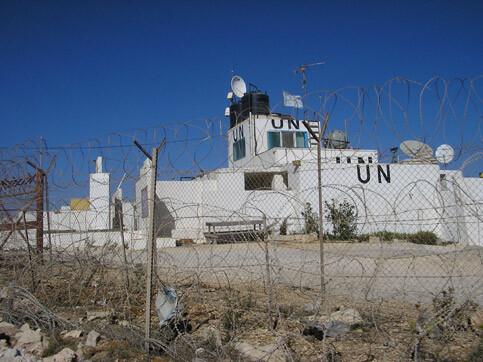United Nations News Service 13 August 2006

There were five incidents of firing from the Israeli side directly inside UNIFIL positions in the areas of At Tiri, Bayt Yahun and Tibnin. (Arjan El Fassed)
On the eve of a planned cessation of hostilities set to end the fighting that has engulfed Lebanon and northern Israel for the past month, violence in the region intensified today, according to the United Nations Interim Force in Lebanon (UNIFIL), which sustained extensive material damage but suffered no additional casualties.
Secretary-General Kofi Annan on Saturday had announced that following talks with the leaders of both countries, “the cessation of hostilities and the end of the fighting will enter into force on 14 August, at 0500 hours GMT.”
Today, UNIFIL reported that over the past 24 hours, fighting worsened throughout southern Lebanon. The Israeli Defence Forces (IDF) “intensified shelling and aerial bombardment across the south,” while Hizbollah “fired rockets in significant numbers.”
There were five incidents of firing from the Israeli side directly inside UNIFIL positions in the areas of At Tiri, Bayt Yahun and Tibnin (3) yesterday and this morning, and one incident of firing from the Hizbollah side directly inside a UNIFIL position in the area of Ghanduriyah yesterday.
The impacts caused extensive material damage in all the positions, but no casualties, the mission said in a news release. There were nine other incidents of firing from the Israeli side close to UN positions in the areas of At Tiri (4), Ghanduriyah (2), Brashit, Tibnin and Ibil as Saqi.
“UNIFIL strongly protested all the incidents to the Israeli and Lebanese authorities respectively.”
The Force’s freedom of movement and the ability to re-supply positions and provide humanitarian assistance were denied because of the lack of security clearance from the IDF and due to the intensive hostilities on the ground. For a week now, a humanitarian convoy to distribute food to the villages in the western sector, and other humanitarian activities planned by UNIFIL, could not proceed because the IDF has denied consent.
Blue helmets were able to facilitate medical assistance to a wounded girl who they relocated to the UNIFIL hospital in Naqoura. Three other wounded Lebanese civilians were relocated from the UNIFIL hospital in Naqoura to the hospital in Tyre for further medical treatment yesterday.
On Friday, weeks of intensive diplomacy culminated in the unanimous adoption by the Security Council of a resolution calling for the cessation of hostilities. The text welcomed the Lebanese Government’s plan to deploy 15,000 troops across the south of the country as Israel withdraws behind the Blue Line. It also backed the simultaneous deployment of UNIFIL with up to 15,000 peacekeepers from the current strength of some 2,000.
The mission will be tasked with monitoring the cessation of hostilities, helping to ensure humanitarian access to civilians and the safe return of displaced persons, and supporting the Lebanese armed forces as they deploy in the south and enforce their responsibilities under the resolution.
In announcing the cessation of hostilities on Saturday, Mr. Annan said there should be an immediate end to the fighting “to respect the spirit and intent of the Council decision, the object of which was to save civilian lives, to spare the pain and suffering that the civilians on both sides are living through.”
Civilians make up the overwhelming majority of the victims of this conflict, which broke out following Hizbollah’s capture of two Israeli soldiers on 12 July. According to the Lebanese Higher Relief Council, over 1,000 Lebanese have been killed and 3,600 wounded, while Israel’s Government reports that more than 40 Israeli civilians have been killed. An estimated one fourth of the entire population of Lebanon has been forced to flee their homes.
Related Links